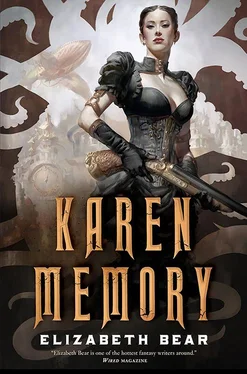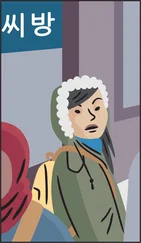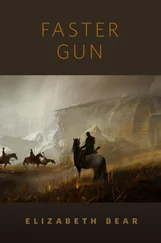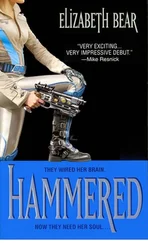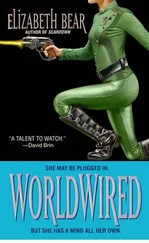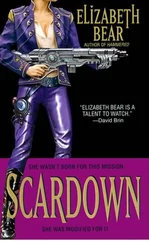It occurred to me to wonder if Marshal Reeves had ever voted in an election. He had mentioned he was in from the Indian Territory, but his voice said Arkansas. Arkansas was a state.
This Marshal might of voted in 1872, I realized. And again in 1876. It wouldn’t of been possible before that. I wondered if it had made him feel different. Or if he had felt like he was making a difference, for that matter.
Of course, it’d never be possible for me. So when I thought about those men in the prospector’s beards voting three, four times apiece and selling every one of them … I don’t mind saying it griped me.
I was quiet while we walked, chewing that over with the rough weave of the Marshal’s sleeve warm against my gloves. He seemed to be taking in the sights, and Miss Francina indulged him. There were some smells, too, but mostly those weren’t so enjoyable.
All around us, Rapid City was booming. We could hear the scrape and rattle of the huge logs being skidded down Skid Road, not two blocks over, and the cursing of the men trying to control their overworked mules as the animals in turn strained to control the logs scraping over paving stones. The streets about boiled over, teeming with carriages and pedestrians and steam cars and the threat of fatal collisions. Scaffolds held up a half-constructed building on every block, and there was a steam shovel or a hydraulic crane at every site. I’d swear the scaffold and construction companies just moved ’em around from week to week as new tenements and blocks of offices were thrown up with abandon in every direction, each one taller and more gilded than the last. After the Chinese lynchings and then the riots in San Francisco the previous year, nobody had wanted to hire the Chinese ironworkers left over now that the biggest planned rail lines were built. But that was all forgotten now, qualms sacrificed on the altar of the goddess Necessity, as Miss Bethel would say.
Finally, we came to Madam Damnable’s, and Marshal Reeves gallantly handed us onto the ladder, then followed us down. At the bottom, by the red cut-glass lanterns flanking the door, he paused. The locksmith and the glazier had both arrived, and the stoop was a confusion of ladders and toolboxes and boards laid across the inevitable puddles. It looked like we’d be open at dinnertime. A young rat skittered past. Trying to look ladylike in front of the Marshal, I didn’t kick at it.
“Well,” the Marshal said. Again, I waited for the double take, the comment. Instead, his silver star glittered in the oblique evening light as he dug in a pocket of his duster. He came out with a parchment roll with a label gummed to it that read: Chase and Company, and I laughed, suddenly, remembering that I’d compared the silver dollar to a candy like this.
Up at street level, I could tell by the sounds that the cart had arrived, and that Crispin was going about unloading it. He’d bring the loads in by the upstairs door around back, where there was a dumbwaiter to bring them down to the kitchen.
The Marshal stuffed his range gloves into the pocket the candy’d come out of, then peeled a hub wafer off the pack and offered it to me. Wintergreen, my favorite. It was a gift, I knowed. But he touched it with his bare fingers rather than offering me the parchment packet to pick my own one out, and so I knowed it was also a test.
I plucked it away from him and put it past my lips, dry and starchy and sweet. It barely fit in my mouth. Soon, the edges started to crumble against my tongue. He gave the clove one to Miss Francina, and we stood around and sucked for a bit. When I had swallowed enough to talk again, I asked him, “Do you wish to come in?”
Marshal Reeves tipped his hat again. “I’ve a wife at home, miss.”
So he hadn’t misconstrued the lanterns. He just hadn’t overmuch cared that my new friend Bill was telling the truth about my line of employment.
Having a wife wouldn’t stop a lot of men, but I wasn’t about to point that out to the rare bird who would let it. So Miss Francina tried another tack. “We have a good cook. I think Karen and I owe you some measure of thanks for rescuing us, Marshal Reeves.”
His smile ruffled his mustache. I thought of draperies. But he shook his head again. “Miss Wilde. Miss Memery. The pleasure of your company has been more than adequate recompense.”
She glanced at me. I made my eyes wide. She covered a smile and said to the Marshal, “We could keep a look out for your fugitive. If you came in and told us about him.”
But a third time, he declined. “I’d rather word didn’t get back to the desperado that I’m hunting him,” he said simply. He patted my hand and Miss Francina’s and, in a swirl of duster panels, vanished back up the ladder into the nascent twilight above.
I palmed Lady Liberty, warm from my bodice, and considered her stubborn profile. How much did they pay U.S. Marshals, that he could afford to hand these out like candy drops?
Miss Francina and I went around to the side door to get inside. Miss Francina went back to the kitchen to oversee the unloading. I went to give Miss Bethel her receipts and change.
In the parlor — still without clients — Miss Bethel was pouring what looked like bright chips of confetti into a crystal candy dish. I wandered over and looked. They were pink and white candy hearts, and they looked just like the hub wafers. A whole shipment of Chase and Company candy must of come in by freight train, I realized, and now everybody in the city could get some. We’d all be sick of them before the last parchment-paper roll got eaten up.
A moment later, I realized each one had some words on it. I picked one up that had bounced out of the bowl. Married in satin, love won’t be lasting.
My mouth still tasted of hub wafer, so I flicked the heart back in with its sisters. “Suits us,” I said.
Miss Bethel winked.
We did plan to open for supper, and judging by the number of men halooing in the third-floor windows starting around sundown, such notoriety around town as might be attending Peter Bantle’s early-morning visit and his new political ambitions weren’t likely to do our trade any harm. I went up to the dressing room and got kitted, all crinolines and kilted skirts and my tits about falling out the top of my daffodil taffeta dress whenever I grabbed a breath. Bea helped me with the beauty patch and did my eyes and lips. She pulled Mr. Marcel’s iron from its heater by the fire and did my hair up with bright paste combs. I did her paint for her: she wears different colors. I’m hopeless with her hair, though, so Miss Francina came over to help.
We all three made sure we was supplied with sheepskins. Syphilis is a bad way to go. Miss Lizzie’s machine can handle more immediate problems, though that ain’t a concern for Miss Francina — but it hurts like hell I hear and there’s always the risk of bleeding out.
And I don’t want no john’s baby saddling me. I’m saving up. Someday I’ll own a stable and be a respectable businesswoman. You’ll see. The girls who stay in the trade, more often than not they keep sliding down the ladder, getting paid less and less for worse and worse work until eventually they can’t save and they can’t make a future. Or some of ’em drink too much, which Madame don’t allow. That don’t end well. Not ever.
I’m not sure why, but that silver cartwheel Marshal Reeves gave me, I tucked it inside my shoe and buttoned up over it. I could feel it there, but the pressure weren’t bad; it just sat against my ankle over the stocking and was comforting, like a squeezed hand. As I was helping Bea with her buttons, the other girls flocked and fluttered in and out. Some dressed faster; some took longer. Pollywog took the longest of anybody, and you could never tell why. She did her long hair in straight blond braids like a German girl and wore what came the closest a grown woman’s dresses could come to an eyelet pinafore.
Читать дальше
